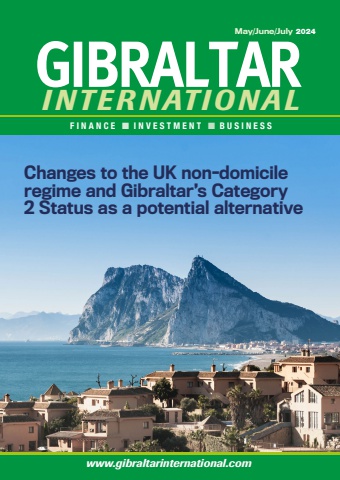Gibraltar gears up for DLT and Blockchain
By Vickram Khatwani Senior Tax Manager, Deloitte
The terms blockchain, cryptocurrency and Distributed Ledger Technology (DLT) have become part and parcel of everyday conversation, spoken by both industry professionals and the general public alike. Gibraltar has not been slow to react. The rise in interest in Gibraltar by Fintech companies over the last few months has been colossal, bringing with them increasingly innovative ideas that use DLT, blockchain or virtual currencies as a means to do business. A phenomenon that is becoming increasing popular globally.
Cryptocurrency Working Group
Gibraltar now finds itself in an enviable position, and deservedly so. Following the initial discussion paper, Virtual Currency: Outline Regulatory Framework, published as far back as January 2016 by the Government of Gibraltar’s (GoG) Cryptocurrency Working Group, the jurisdiction has gone from strength to strength, leveraging off local and international industry expertise, to set in motion the steps necessary to introduce a regulatory framework for businesses engaging in activities that use DLT for the transmission or storage of value belonging to others. In May 2017, a further consultation paper, Proposals for a DLT Regulatory Framework, was issued by GoG for public consultation. Following on from this, Gibraltar is now on the brink of becoming one of the only jurisdictions in the world to regulate DLT business, with draft legislation on the regulatory framework already complete and undergoing final reviews ready to hit our statute books as from 1st January 2018. A new industry is on the cusp of birth and Gibraltar, with its well-developed infrastructure, flexibility and competitive tax regime, provides the ideal business environment to nurture new businesses in this space. But this is just the start. Whilst the excitement is clear to see, and the opportunities for the jurisdiction are rife, as an internationally reputable financial services centre, Gibraltar is keen to maintain its position as a sound and safe place to do business and build on past successes based on the very same virtues that have proved so valuable in other sectors.
Initial Coin Offerings
The new regulatory framework for DLT will be principles based and the key principles have been set out in the consultation paper of May 2017. This is beneficial both for the regulator as their approach can be customised to each company, and the licensed company who will hopefully see more relevant criteria applied to them and less compliance for the sake of meeting general rules. Although this framework seeks to regulate the activities of firms that use DLT to store or transmit value belonging to others, consideration is also being given to the wave of early-stage start-ups looking to raise finance through the creation and sale of tokens or coins based on DLT, also known as Initial Coin Offerings (ICO) or token sales. The fact that ICOs are an unregulated means of raising finance for start-up projects that have sometimes still not gone through early development, can raise flags about the sustainability of the projects on which these funds will be invested. In its statement on 22nd September 2017, the Gibraltar Financial Services Commission (GFSC) are already considering a further regulatory framework covering ICOs and the grounds on which these can be carried out from Gibraltar, expected to follow 3 or 4 months down the line, which would complement the DLT regulatory regime. It is envisaged this complementary framework would set out standards which need to be adhered to by any new entrants interested in carrying out ICOs from or in Gibraltar.
Managing in a new industry does have its challenges, however, it also provides a jurisdiction with the ideal opportunity to set the ground rules for new entrants very early on. This is where Gibraltar finds itself at the moment. Companies looking to set up and operate in Gibraltar as regulated entities under the proposed DLT regulatory framework will have to comply with the principles set out therein, with a view to maintaining the three desired regulatory outcomes – consumer protection, economic benefit and the protection of Gibraltar’s reputation.
A sustainable industry
In reality, the principles set out should serve as guidelines not just to those interested in undertaking regulated activity, but to unregulated activities as well, for example those companies looking to raise finance via ICOs. From the onset, any companies interested in operating in this space should, other than having a good realistic commercial idea, be dealing in standard good business practices including having good corporate governance, strong internal controls, sound monitoring systems and access to the key skills and professional advisors to help them. These are just a few of the ingredients required to give Gibraltar every chance of making this industry a sustainable one.
New entrants should look at the success of Gibraltar’s online gaming industry as testament to Gibraltar’s approach to developing the jurisdiction as a world class location for new industries. The Gibraltar Licensing Authority made a point of only considering ‘blue chip companies’ with proven track records, good financial standing, strong corporate governance and realistic business plans when entertaining gaming license applications. If played right, the potential is there for the DLT industry to mimic similar success and possibly become the fifth pillar of Gibraltar’s strong economy.


